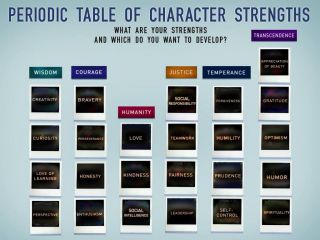Spirituality
How to Build Character
An interview with filmmaker Tiffany Shlain about character development.
Posted March 19, 2014

Looking at the Best Picture nominees from the most recent Academy Awards—Gravity, 12 Years a Slave, Dallas Buyer’s Club—it was clear that stories about overcoming adversity resonate with people. There’s something appealing about the quest to make the most of a situation, no matter how trying, and to come out better on the other side. It’s always inspiring to be reminded that we can grow and develop throughout our lives. That’s why I was excited to have the chance to speak with filmmaker Tiffany Shlain. Shlain founded the Webby Awards and was honored by Newsweek as one of the “Women Shaping the 21st Century.” Her latest film, which premieres March 20, 2014, is The Science of Character. She invites everyone to participate in #CharacterDay.
Josh: So first of all, for people who aren’t familiar, can you tell us what The Science of Character is about? And what’s #CharacterDay?
Tiffany: It’s a chance to have everyone focus on their character. In the film we bring up the history of thoughts on character development and newer research advancing those ideas. The people at Common Sense Media developed discussion guides for groups to apply these ideas so we can all think about our own character strengths. The goal is to challenge you to think of what your character means to you, and how you can build on your own strengths and those of people in your community—your friends and family. Then there’s a global Q and A session with leading researchers on character development.
J: And what is your goal with the project?
T: It’s to get people talking. We wanted to screen the film in 250 schools. We’ve got around 1,500 screenings scheduled in 40 different countries—they’ll all be talking and thinking about this. There will be screenings in schools, religious groups, community centers, even in a prison. That really shows that this is something everyone can think about. The response has been so big we’re thinking of having #CharacterDay again in 2015.
J: What do you hope to accomplish with the film?
T: We want people to watch the film and think about the questions it raises. Humans are curious creatures. We want people to explore how to improve, to push the needle. We can improve ourselves, and we’re all part of interdependent loops. We can be part of the improvement of people around us, too.
I want to point people to cool things, introduce them to ideas. I’m a conversation-maker. When I was in my 20s, I had a chance to found the Webby Awards. In the 90s, the web was nerdy. But I thought, this will change the world. The awards were chance to let the world know about the web.
J: What is new in the field of character development?
T: In the film, we go back through the big thinkers on this throughout time, Plato, Aristotle, Montessori. I was also really interested in Angela Duckworth’s recent work on grit and how that shapes people for success. One of the ideas is that we can focus on a few strengths and develop them. I wanted to take those ideas and share them as widely as possible.
J: Why did you want to do this project, and why now?
T: I was handed the research and found it really compelling. I do things that interest me, and when I saw this, it did. When something interests me, I want to learn more. The way I do that is by making a film about it. That way I can really dive into the topic and learn about it.
J: So it sounds like one of your biggest character strengths is curiosity. What are some of the ways you’ve applied the lessons you’ve learned about character development to your own life?

T: One day a week my family takes a technology shabbat. We take one day a week to unplug all our screens. It’s something we decided to do as a group. I’m actually looking at the periodic table of character strengths right now and thinking about how the tech shabbat fits into that.
Part of it is self-restriction; we learn to give up something. It’s also about perspective. Things happen so quickly during the week. Taking that one day off gives you time to process things, to think about what they mean and how they affect us. I can realize why something is stressing me out.
It’s also about sharing love with my family. We all do it together, and it’s an opportunity to bond over something. That gives an opportunity for gratitude. We can be thankful for the time we spend with each other. Unplugging also gives a chance for appreciation of beauty. Rather than looking at a screen, you look at the garden and notice how things are growing.
Lastly, it’s about spirituality. I’m not a very religious person, but it’s spiritual to take that time to appreciate things, and get in touch with the world around you. I was on a plane the other day looking at a screen. I put my head up and looked out the window and we were just above some big fluffy white clouds. I was like, “Oh my God, I’m in a cloud! How amazing is that!” Being near the clouds, I also think about my father, who recently passed away. Taking my attention away from my screen gave me the chance to think about him, to reconnect.
J: What’s the most important thing we should take away from this film?
T: To be inspired to think about our strengths. What can we work on and what our character means.
J: Lastly, since this is a neuroscience blog, I’ve noticed you use brain metaphors frequently when you’re explaining things. Why does the brain resonate with you?
T: When I was in 4th grade, my dad brought a brain in a bucket to our class. He was a surgeon. So I was always exposed to that at a young age. And when I was eight, my mom got her PhD in psychology, so we would talk about those things together. I guess we were often talking about the brain and psychology growing up, so that’s part of how I see the world. My very first film was called Zoli’s Brain. So that was all a strong influence on me.
J: Thanks so much for taking the time to talk with me, Tiffany. Good luck with the film and #CharacterDay!




